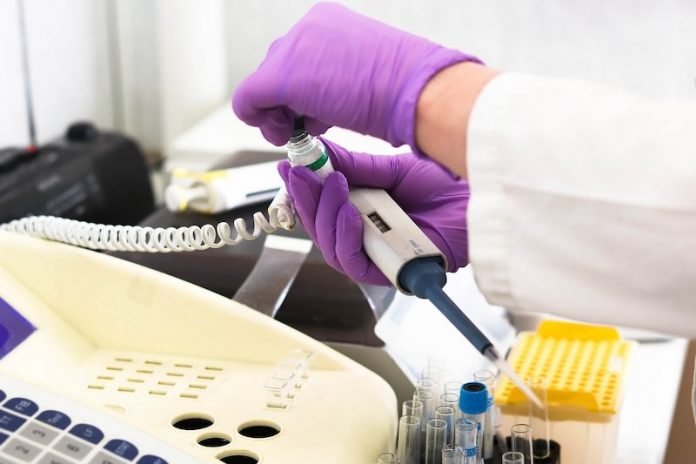
In a new study from Penn State, researchers found a new urine-testing system could allow people who have kidney stones to receive results within 30 minutes instead of the current turnaround time of a week or more.
Kidney stones occur due to the buildup of certain salts and minerals that form crystals, which in turn stick together and enlarge to form a hard mass in the kidneys.
The stones move into the urinary tract and can cause blood in the urine, considerable pain, and blockages in the urinary system.
Metabolic testing of a kidney stone patients’ urine to identify metabolites such as minerals and solutes that cause stones to form is key for preventing future ones.
This testing currently requires the patient to collect their urine over a 24-hour period in a large container. The patient then sends the container to a lab for analysis and the results normally come back in 7 to 10 days.
The lengthy process, cumbersome collection procedure, and delay in obtaining the results render 24-hour urine testing to be underutilized in clinical practice despite guideline recommendations.
In the study, the researchers developed a biomimetic detection system they call slippery liquid-infused porous surface (SLIPS)-LAB.
SLIPS is a dynamic, extremely low-friction smooth surface created by locking lubricating liquids in micro/nanostructured substrates.
SLIPS-LAB enables reagent and urine droplets to easily move over the slick surface of the testing device’s fluid addition channel and not get stuck.
A Laplace pressure difference—a small pressure force due to surface tension, induced by the geometry of the device—drives the droplet. This enables the reactants to combine with the urine at the necessary timed rate for reaction.
The team demonstrated that SLIPS-LAB enables the reagent and sample to move themselves and perform the reactions.
This means the technology doesn’t require a technician to run any test machinery, so it is possible to do the test in non-traditional settings, like a physician’s office or even the patient’s home.
The test results can then be read using a scanner or a cell phone, and a computer algorithm can then analyze the scanned image.
All these steps would take approximately 30 minutes in a physician’s office. An added benefit, is that SLIPS-LAB is more cost-effective than regular, 24-hour testing.
The team hopes the low cost, rapidity, and simplicity of SLIPS-LAB would reduce the barrier for the clinician and patient to undergo stone risk metabolite analysis.
This would improve the management of patients with urinary stone disease and open new possibilities for stone patients to test their urine samples in mobile health settings.
If you care about kidney health, please read studies about these blood fats could cause inflammation, harm blood vessels and kidneys and findings of this stuff in blood could protect against heart failure, kidney damage.
For more information about kidney disease prevention and treatment, please see recent studies about this kidney problem linked to heart failure and results showing that this FDA-approved drug could protect kidney health in people with diabetes.
The study is published in Science Advances. One author of the study is Pak Kin Wong.
Copyright © 2021 Knowridge Science Report. All rights reserved.



